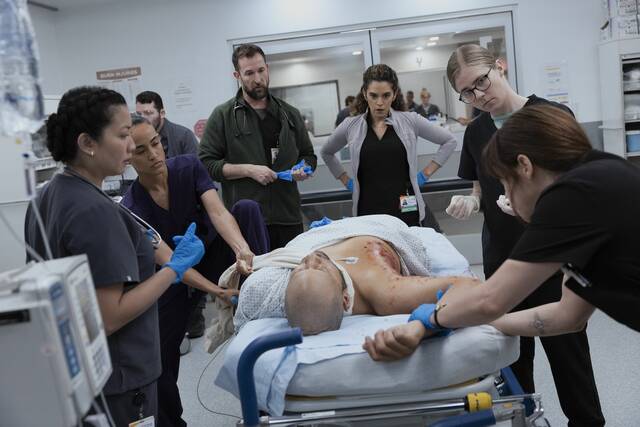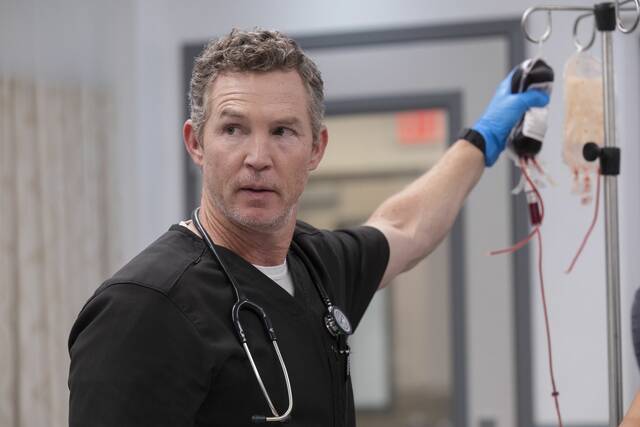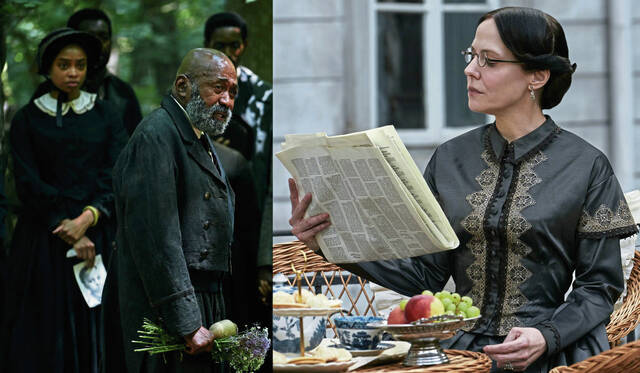When actress Adrienne Warren showed up on the set of Netflix’s bio-pic “Rustin,” which is filming in Pittsburgh through mid-January, the period wardrobe looked familiar from her work playing Mamie Till-Mobley on ABC’s “Women of the Movement” (8 p.m. Thursday, WTAE-TV). Both projects take place during the 1950s/60s civil rights era.
“With the clothes, I was like, oh, it’s the same clothes I just had on,” Warren said in a Zoom interview late last month, “but I will say, very different characters.”
“Women of the Movement,” a six-hour limited series airing in three parts, tells the story of the murder of Emmett Till and his mother’s decision to have an open-casket, public viewing so Americans could see the brutality inflicted on him and then her drive to bring his killers to justice in the trial that followed. Knowing what will become of Emmett, the first two hours are not an easy watch – but it’s a necessary story to tell.
“Unfortunately, this story is so spot on,” said actor Glynn Turman, who plays Mamie’s uncle and co-starred in Pittsburgh-filmed “Ma Rainey’s Black Bottom” and is also in “Rustin.” “In 1955, a young lady by the name of Mamie Till Mobley sought justice for her son. On November 24th, [2021,] that young lady, Mamie Mobley, [would have] turned 100 years old. On November 24th, that same day, Ahmaud Arbery found justice [when his killers were convicted of his murder]. His mother found justice for her son finally. All of these many years later, justice was accomplished for her seeking justice for her son on the birthday of Mamie Till Mobley. And there’s some kind of poetic justice in that, but it just also lets you know how the more things change, the more they stay the same.”
Warren emphasized that “Women of the Movement” is not a true-crime story.
“This is about a family and a lot of things happened to that family,” Warren said. “I knew about what happened to this family, but I didn’t know about this family. So it’s not necessarily about what happened to them, but it’s about who it happened to.”
Warren credited “Women of the Movement” showrunner/writer Marissa Jo Cerar with telling Mamie Till-Mobley’s story as an origin story.
“She shows the nuances of our hero, Mamie Till-Mobley,” Warren said. “So often we don’t get to learn about how our heroes get their capes, how they actually become the activists, how that person actually becomes the lawyer or whatever it is. This story is for everyone because it shows you just how the power of one person — one person going through a lot of pain — and what that person was able to do with it. She made a decision that was very, very difficult, but that decision was a catalyst for the civil rights movement and what an incredible thing that is.”
Cerar said it was important to her that the series introduced Emmett’s family before the tragedy.
“It was really important to me that we did not begin the series with a dead body,” she said, noting she wrote the series over the summer of 2020, when George Flloyd was murdered by Minneapolis police. “I did not want to be that show. I wanted to begin with birth because I wanted the audience to see their brother, their cousin, their neighbor, their child’s friend at school, their student, the little boy who walks into the corner store. That’s who I wanted them to see. I didn’t want them to see a victim in a body bag, because that’s what we see too frequently in the news and other true-crime series … I wanted this to be a family drama that happens to be about a true crime.”
(An ABC News docu-series, “Let the World See,” about the Emmett Till story, airs at 10 p.m. Thursdays beginning this week, following “Women of the Movement.”)
As for “Rustin,” Warren was hesitant to talk much about her character, Claudia Taylor. Online searches for “Claudia Taylor” suggest this may be a fictional or composite character in “Rustin,” the story of Bayard Rustin (Colman Domingo, another returnee from “Ma Rainey’s Black Bottom”), a gay civil rights activist who was part of organizing the 1963 March on Washington that culminated in Martin Luther King Jr.’s “I Have a Dream” speech.
“The beauty of [director] George C. Wolfe’s ‘Rustin’ is he is sharing the nuances of our heroes again,” Warren said. “He is sharing those moments in between, those moments behind closed doors, the moments at the starting line and then the finish line, which is the March on Washington. It’s incredible to get a little bit of an inside look at those who we admire so much.”
Warren said “Rustin,” like “Women of the Movement,” humanizes its heroic civil rights crusaders.
“So often when we learn about our history, we see pictures that are often in black and white, and we don’t see our heroes as us,” she said. “We don’t even know how young they are. That was something that I learned about Mamie: She was 33 years old. I was 33 when I shot it. When you realize that, that puts everything into context, and then you sit back and you’re like, ‘What am I doing with my life right now?’ That is the beauty of bringing these stories to the forefront right now because we’re able to see ourselves in them and that is pretty remarkable. We all are capable of the power and influence of those that we look up to.”











